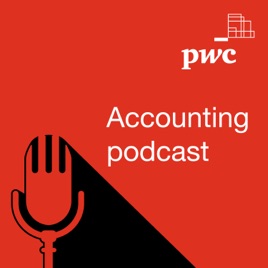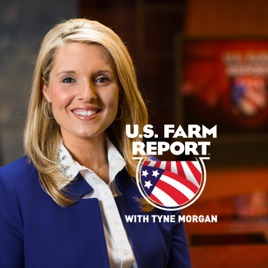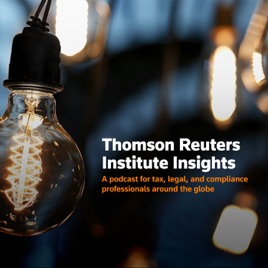
Advertise on podcast: PwC's accounting podcast
Rating
4.5 from
Country
This podcast has
457 episodes
Language
Publisher
Explicit
No
Date created
2015/07/09
Average duration
42 min.
Release period
4 days
Description
Our accounting podcast features PwC specialists discussing today's most compelling accounting, regulatory and financial reporting issues. From the new leases and revenue standards to CECL to LIBOR rate replacement, PwC Partner Heather Horn hosts each episode tackling a single topic and providing listeners with key takeaways to stay informed on these important accounting matters.
Social media
Check PwC's accounting podcast social media presence
Podcast episodes
Check latest episodes from PwC's accounting podcast podcast
CSRD spotlight: Basics of reporting boundaries
2024/02/22
The European Union (EU) has ushered in a new era of sustainability reporting, as the Corporate Sustainability Reporting Directive (CSRD) is now effective. With impacts to both EU and non-EU headquartered companies, now is the time to understand the reporting requirements of this sweeping new regulation.
Continuing our CSRD series, this week Heather Horn is joined by Peter Flick and Nina Schäfer to discuss the topics of reporting boundaries and other common CSRD implementation questions companies are facing.
In this episode, you’ll hear:
3:30 – Explanation of the concepts of reporting boundaries and value chain in sustainability reporting8:59 – An analogy of concentric circles to explain the concept of own operations and value chain12:24 – A discussion on the importance of considering subsidiaries in ESG reporting23:01 – Insights on the impacts of leasing contracts and special purpose entities on sustainability reporting33:16 – Context for the implementation guidance provided by EFRAG for companies starting with their adoption of CSRD reportingLooking for the latest developments in sustainability reporting? Follow this podcast on your favorite podcast app and subscribe to our weekly newsletter to stay in the loop for the latest thought leadership on sustainability standards.
Peter Flick is the Sustainability Reporting Technical Leader for PwC Germany, where he oversees a team focused on sustainability reporting issues in the National Office. Prior to taking on sustainability reporting, Peter consulted with clients on complex financial instrument accounting under IFRS and German GAAP.
Nina Schäfer is a Director in PwC Germany’s National Office, where she focuses on sustainability reporting technical issues and consultations.
Heather Horn is PwC’s National Office thought leader, responsible for developing our communications strategy and conveying firm positions on accounting and financial reporting matters. She is the engaging host of PwC’s accounting and reporting weekly podcast and quarterly webcast series. With over 30 years of experience, Heather’s accounting and auditing expertise includes financial instruments and rate-regulated accounting.
Transcripts available upon request for individuals who may need a disability-related accommodation. Please send requests to us_podcast@pwc.com.
more
Presenting discontinued operations
2024/02/20
We continue our month of podcasts focused on financial statement presentation.
In this episode, host Heather Horn sits down with Jay Seliber, a partner in PwC’s National Office specializing in business combinations, to share insights on the accounting and reporting considerations for discontinued operations. Together, they unpack the judgments and practical challenges in navigating discontinued operations, an area of increased focus given the current economic environment in which many companies are considering disposing of portions of their businesses.
In this episode, you’ll hear:
2:27 – An overview of the criteria and qualifications for discontinued operations, including highlights of the key areas of judgment, timing considerations, and implications for businesses13:05 – Insights on the qualifications for held-for-sale treatment 18:40 – Key questions on presentation and classification of discontinued operations after meeting the gating criteria, including:19:01 – Impact to the balance sheet and income statement21:45 – Debt and income tax implications25:25 – Impact on earnings per share (EPS) computations28:55 – Statement of cash flows implications30:50 – Overview of the SEC filing requirements related to discontinued operations36:16 – Final advice for preparers on presenting discontinued operationsFor more information, read chapter 27 of our Financial statement presentation guide and chapter 12 of our Income taxes guide. Additionally, follow this podcast on your favorite podcast app for more episodes.
Jay Seliber is a partner in PwC’s National office. He leverages over 30 years of experience to help clients with their most complex accounting matters, particularly in the areas of mergers and acquisitions, revenue recognition, stock compensation, earnings per share, employee benefits, restructurings, impairments, and financing transactions.
Heather Horn is PwC’s National Office thought leader, responsible for developing our communications strategy and conveying firm positions on accounting and financial reporting matters. She is the engaging host of PwC’s accounting and reporting weekly podcast and quarterly webcast series. With over 30 years of experience, Heather’s accounting and auditing expertise includes financial instruments and rate-regulated accounting.
Transcripts available upon request for individuals who may need a disability-related accommodation. Please send requests to us_podcast@pwc.com.
more
ISSB: The latest in global adoption of its standards
2024/02/15
The International Sustainability Standards Board (ISSB) issued final IFRS® Sustainability Disclosure Standards (SDS) in June of 2023. Multiple jurisdictions around the world have signaled their intent to adopt the new standards, including some with fulsome legislative or regulatory proposals.
To capture the latest updates regarding the adoption of ISSB standards, Heather Horn sat down with Katie Woods, PwC UK Senior Director, to discuss measures advancing the standards in specific jurisdictions, as well as other important updates on the standard setter’s recent activities.
In this episode, you’ll hear discussion of:
3:15 – The International Sustainability Standards Board (ISSB) and its role in the global framework4:00 – The first two standards issued by the ISSB, including the general disclosure standard and the climate standard4:19 – Countries moving forward with potential adoption of ISSB standards7:32 – Updates on Singapore's adoption of ISSB standards and its impact on public and large private companies in Singapore8:12 – An update on the UK's approach to sustainability disclosure standards as well as a rundown of other countries’ recent measures on sustainability reporting14:45 – The ISSB’s work to internationalize Sustainability Accounting Standards Board (SASB) standards, and its recently issued educational materials20:42 - The focus of the ISSB's next thematic standards and the importance of the digital taxonomy in sustainability reporting27:10 – The importance of understanding multiple reporting frameworks to keep up with the rapid pace of change in sustainability reportingLooking for the latest developments in sustainability reporting? Follow this podcast on your favorite podcast app and subscribe to our weekly newsletter for the latest thought leadership on sustainability standards.
Katie Woods is a Senior Director in PwC's Global Corporate Reporting Services - sustainability group advising on ESG and International accounting standards. Katie specializes in the new and emerging ESG reporting frameworks working across the PwC Network. She has over 30 years of experience working with a broad range of companies. Katie speaks regularly on a range of ESG and accounting topics at national and international seminars.
Heather Horn is PwC’s National Office thought leader, responsible for developing our communications strategy and conveying firm positions on accounting and financial reporting matters. She is the engaging host of PwC’s accounting and reporting weekly podcast and quarterly webcast series. With over 30 years of experience, Heather’s accounting and auditing expertise includes financial instruments and rate-regulated accounting.
Transcripts available upon request for individuals who may need a disability-related accommodation. Please send requests to us_podcast@pwc.com.
more
Presenting the income statement
2024/02/13
We continue our month of podcasts focused on financial statement presentation hot topics.
In this episode, host Heather Horn sits down with Pat Durbin, a deputy chief accountant in PwC’s National Office, and Felix Perez, a partner in PwC’s National Office specializing in SEC reporting, to discuss the significance of income statement presentation to the investor community and standard setters. Together, they break down key areas of judgment and the practical challenges involved in income statement presentation and classification.
In this episode, you’ll hear:
1:34 - The significance of income statement presentation and classification in portraying financial performance, including general reporting considerations and the interaction between income statement presentation and non-GAAP metrics8:50 - The SEC's rules on the form and content of income statements, including considerations for financial institutions21:44 - Income and expense disaggregation reminders, including classification of operating versus non-operating expenses as well as considerations for cost of sales, depreciation, and amortization33:50 - The complexities of income statement classification in collaborative arrangements, discontinued operations, and impairments42:05 - An update on the FASB project on disaggregation of income statement expenses (DISE) projectFor more information, read chapter 3 of our Financial statement presentation guide. Additionally, follow this podcast on your favorite podcast app for more episodes.
Pat Durbin is a Deputy Chief Accountant in PwC’s National Office. He has over 30 years of experience consulting with our clients and engagement teams on complex accounting matters, including issues related to revenue, compensation, income taxes, and inventory under both US GAAP and IFRS.
Heather Horn is PwC’s National Office thought leader, responsible for developing our communications strategy and conveying firm positions on accounting and financial reporting matters. She is the engaging host of PwC’s accounting and reporting weekly podcast and quarterly webcast series. With over 30 years of experience, Heather’s accounting and auditing expertise includes financial instruments and rate-regulated accounting.
Felix Perez is a partner in PwC’s National Office specializing in SEC reporting. He has over 25 years of experience serving clients and engagement teams across financial services and technology sectors.
Transcripts available upon request for individuals who may need a disability-related accommodation. Please send requests to us_podcast@pwc.com.
more
Investors want a credible sustainability strategy — and reporting
2024/02/08
Investors today want to better understand how companies are managing crises and staying resilient, while creating and protecting long-term value in today’s fracturing world. They are looking closely at two areas—emerging technology and sustainability—to gauge whether companies can seize opportunities for reinvention and business transformation, or whether they will instead succumb to rivals.
That’s according to PwC’s most recent Global Investor Survey, which is now in its third consecutive year. To break down some of the survey’s results and their implications for preparers, Heather Horn sat down with Nadja Picard, PwC’s global reporting leader.
In this episode, you’ll hear:
3:19 - The importance of sustainability in the context of broader business activity and how it is no longer a siloed topic 5:54 – How investors prioritize agility in managing long-term risks and opportunities 17:25 - The challenges companies face in collecting and managing sustainability data and the importance of having a well-defined data strategy 18:19 - The importance of credibility in sustainability reporting and how investors are looking for strategies that are underpinned by good plans 24:43 - Investor perspectives and beliefs on corporate greenwashing, per our survey 29:41 - The learning journey of companies in implementing sustainability reporting and the role of regulators in this process 32:58 - The future of sustainability reporting and the role of technology in improving data collection and reporting Looking for the latest developments in sustainability reporting? Follow this podcast on your favorite podcast app and subscribe to our weekly newsletter to stay in the loop for the latest thought leadership on sustainability standards.
Nadja Picard is PwC’s Global Reporting Leader. In this role, she leads PwC’s global initiative to help clients transform their corporate reporting to meet investor and stakeholder demands for trusted and assured reporting beyond financial reporting. Nadja also advises companies on the accounting, corporate reporting, and investor relations requirements in advance of capital markets transactions, especially IPOs.
Heather Horn is PwC’s National Office thought leader, responsible for developing our communications strategy and conveying firm positions on accounting and financial reporting matters. She is the engaging host of PwC’s accounting and reporting weekly podcast and quarterly webcast series. With over 30 years of experience, Heather’s accounting and auditing expertise includes financial instruments and rate-regulated accounting.
Transcripts available upon request for individuals who may need a disability-related accommodation. Please send requests to us_podcast@pwc.com.
more
Presenting earnings per share (EPS)
2024/02/06
We kick off another month of podcasts, this time focused on financial statement presentation hot topics. Drumroll please... This week we are presenting EPS.
In this episode, host Heather Horn sits down with John Horan, PwC National Office managing director, to discuss the significance of earnings per share (EPS), focusing on the practical challenges and judgments involved in this not-so-simple, but very closely-watched, computation.
In this episode, you’ll hear:
00:56 - The significance of EPS to the analyst and investor community02:59 - A refresher of the differences between basic and diluted EPS and a discussion of judgments involved in the computation, including redeemable securities9:50 - A discussion of the impact of changes in capital structure and reorganizations, including stock dividends, stock splits, and IPOs, on the EPS computation20:25 - Reporting reminders, including disclosure requirements and considerations related to subsequent eventsFor more information, read chapter 7 of our Financial statement presentation guide. Additionally, follow this podcast on your favorite podcast app for more episodes.
John Horan is a managing director in PwC’s National Office where he assists clients with complex accounting issues in the areas of foreign currency, liabilities and equity, earnings per share, and derivatives and hedging. John specializes in large capital transactions and initial public offerings.
Heather Horn is PwC’s National Office thought leader, responsible for developing our communications strategy and conveying firm positions on accounting and financial reporting matters. She is the engaging host of PwC’s accounting and reporting weekly podcast and quarterly webcast series. With over 30 years of experience, Heather’s accounting and auditing expertise includes financial instruments and rate-regulated accounting.
Transcripts available upon request for individuals who may need a disability-related accommodation. Please send requests to us_podcast@pwc.com.
more
How GRI is addressing the challenges of global reporting
2024/02/01
Even as mandatory sustainability reporting regulations near effective dates in jurisdictions around the world, voluntary reporting remains an important part of many companies’ disclosures. With more than 10,000 companies around the world using its standards, the Global Reporting Initiative (GRI) remains a key standard setter in the impact reporting space.
Today’s guest makes the case that there are myriad benefits to voluntary reporting – not the least of which is preparation for mandatory reporting. Host Heather Horn sits down with Eelco van der Enden, CEO of GRI, to discuss GRI's recent accomplishments and the path ahead for sustainability reporting around the world.
In this episode, you’ll hear them discuss:
1:05 - GRI’s accomplishments in the past year6:29 - The development of a digital taxonomy that will facilitate interoperability between the European Sustainability Reporting Standards (ESRS) and GRI12:16 - The overlap between impact reporting and financial materiality, and the importance of considering demographic challenges, climate change, and related legislation in impact reporting17:45 - The collaboration between GRI and the International Sustainability Standards Board (ISSB) in launching a Sustainability Innovation Lab in Singapore30:53 – How GRI is innovating to support small and medium company reporting39:16 – The launch of GRI’s new disclosure standard on biodiversity41:15 – How standard setters are working together to address the challenges faced by companies in complying with multiple reporting regimesLooking for the latest developments in sustainability reporting? Follow this podcast on your favorite podcast app and subscribe to our weekly newsletter to stay in the loop for the latest thought leadership on sustainability standards.
Eelco van der Enden is the CEO of the Global Reporting Initiative. Prior to this role, Eelco led PwC’s global ESG platform for the Tax & Legal and People Services, and PwC's Tax Administration Consulting practice. Eelco is also Chairman of the Tax Policy Group of Accountancy Europe, and has published multiple articles on tax governance and reporting.
Heather Horn is PwC’s National Office thought leader, responsible for developing our communications strategy and conveying firm positions on accounting and financial reporting matters. She is the engaging host of PwC’s accounting and reporting weekly podcast and quarterly webcast series. With over 30 years of experience, Heather’s accounting and auditing expertise includes financial instruments and rate-regulated accounting.
Transcripts available upon request for individuals who may need a disability-related accommodation. Please send requests to us_podcast@pwc.com.
more
Getting ready for OECD Pillar Two
2024/01/30
This week, we begin a collaboration with another popular PwC podcast. Host Heather Horn is joined by Doug McHoney, PwC International Tax Services Global Leader and host of the “Cross-border Tax Talks” podcast. Doug shares insights on the revolutionary new global tax system — the Organisation for Economic Cooperation and Development (OECD) Pillar Two framework — and its impact on companies worldwide.
The objective of Pillar Two is for large multinational enterprises to pay a minimum level of tax (a threshold effective tax rate of 15%) on the income arising in each jurisdiction where they operate. Doug joins us to shed light on the judgments involved and what companies can do to prepare.
In this episode, you will hear:
3:15 - A refresher on Pillar Two, the first global tax system for multinational companies, including:4:30 - A breakdown of the four operating rules prescribed by the framework and the breadth of impact on companies worldwide11:00 - An overview of enactment timing and the three-year transitional safe harbor provisions13:35 - A discussion of the intersection between Pillar Two and US tax policy, including the impact on US companies18:09 - A comparison of the mechanics of Pillar Two and current practice, including an overview of key tax adjustments28:50 - Practical considerations, including materiality considerations, for companies preparing to comply with Pillar Two36:15 - Data and controls implications as companies revamp tax policies and procedures41:50 - Final advice for companies looking to achieve operational readiness for Pillar TwoFor more on OECD’s Pillar Two, read our publication, Global taxation: More than an idea - what it means for you now, as well as our prior podcast, Tax policy update - OECD and domestic minimum taxes.
Additionally, check out PwC International Tax Services’ “Cross-border Tax Talks” podcast, and follow both podcasts on your favorite podcast app for upcoming episodes.
Doug McHoney is PwC's Global International Tax Services Leader, helping clients worldwide understand a wide range of global and local tax policy developments and providing technology-enabled consulting services. Doug also hosts the Cross-border Tax Talks podcast series, providing listeners with the latest trends in taxation.
Heather Horn is PwC’s National Office thought leader, responsible for developing our communications strategy and conveying firm positions on accounting and financial reporting matters. She is the engaging host of PwC’s accounting and reporting weekly podcast and quarterly webcast series. With over 30 years of experience, Heather’s accounting and auditing expertise includes financial instruments and rate-regulated accounting.
Transcripts available upon request for individuals who may need a disability-related accommodation. Please send requests to us_podcast@pwc.com.
more
2023 Year-end toolkit: Lessons learned from SEC enforcement
2024/01/25
In each episode of our Year-end toolkit series, our guests share insights on key areas of the year-end accounting and reporting process.
This week, host Heather Horn is joined by Pete Driscoll, PwC National Office partner, to break down the SEC’s 2023 enforcement action results, which set a record with 784 enforcement actions filed in 2023. Pete unpacks the themes and trends within those enforcement actions and shares advice on what companies can do to avoid some common pitfalls.
Listener note: Although we summarize key themes from allegations as described by SEC orders and complaints, it is important to note that companies have neither admitted nor denied wrongdoing in these cases.
In this episode, you will hear:
2:15 - Key themes in the SEC's 2023 enforcement action results, including a discussion of the SEC’s priorities and approach to enforcement11:10 - A discussion of the increased focus on cybersecurity, including rulemaking considerations 12:30 - An analysis of financial reporting and misstatement cases, including internal control considerations18:50 - Insight into the SEC's interest in the digital asset space, including cases involving cryptocurrencies and non-fungible tokens (NFTs)23:30 - The importance of maintaining adequate books and records, including a discussion of cases brought in this area27:20 - Final insights on the long-term implications of SEC enforcement actions and advice for companies reviewing their business practicesPete Driscoll is a partner in PwC’s National Office focusing on SEC regulations, reporting, and compliance. Prior to his role at PwC, Pete held several roles at the SEC, including Director of the Division of Examinations and Chief Risk and Strategy Officer.
Heather Horn is PwC’s National Office thought leader, responsible for developing our communications strategy and conveying firm positions on accounting and financial reporting matters. She is the engaging host of PwC’s accounting and reporting weekly podcast and quarterly webcast series. With over 30 years of experience, Heather’s accounting and auditing expertise includes financial instruments and rate-regulated accounting.
Follow this podcast on your favorite podcast app for other episodes in our Year-end toolkit series.
Transcripts available upon request for individuals who may need a disability-related accommodation. Please send requests to us_podcast@pwc.com.
more
2023 Year-end toolkit: Conquering the statement of cash flows
2024/01/23
In each episode of our Year-end toolkit series, our guests share insights on key areas of the year-end accounting and reporting process.
In this episode, guest host Kevin Vaughn, PwC National Office partner, sits down with Suzanne Stephani, PwC National Office director, to discuss the significance of the statement of cash flows, focusing on the practical challenges and judgments involved in the classification of cash flows.
In this episode, you will hear:
2:05 - Frequent challenges and restatements related to the statement of cash flows 5:10 - Insights from the SEC Chief Accountant, Paul Munter, on risk management and controls related to the statement of cash flows as well as considerations for assessing the materiality of cash flow restatements14:15 - Fundamental principles of the statement of cash flows, including the identification of cash equivalents and related disclosure considerations 21:40 - Gross versus net presentation on the statement of cash flows, including considerations for non-cash and nonrecurring transactions27:25 - Key areas of judgment, including:27:25 - Applying the concept of constructive receipts and disbursements when dealing with third-party or agent transactions32:58 - The impact of debt transactions, including debt extinguishments and restructurings, on the statement of cash flows40:50 - Considerations when dealing with lease modifications, business combinations, discontinued operations, and classification of cash flows associated with treasury billsFor more information, read chapter 6 of our Financial statement presentation guide. Additionally, follow this podcast on your favorite podcast app for upcoming episodes in our Year-end toolkit series.
Suzanne Stephani is a director in PwC’s National Office specializing in the statement of cash flows, as well as the application and interpretation of the accounting guidance related to financing and leasing transactions.
Kevin Vaughn is a partner in PwC’s National Office. Prior to joining PwC, Kevin was senior associate chief accountant in the Office of the Chief Accountant (OCA) at the SEC where he spent almost 20 years focusing on complex financial reporting and technical accounting issues.
Transcripts available upon request for individuals who may need a disability-related accommodation. Please send requests to us_podcast@pwc.com.
more
2023 Year-end toolkit: Balance sheet classification of debt
2024/01/18
In each episode of ourYear-end toolkit series, our guests share insights on key areas of the year-end accounting and reporting process.
In this episode, guest host Kevin Vaughn, PwC National Office partner, sits down with Suzanne Stephani, PwC National Office director, to discuss the judgments and complexities involved in the balance sheet classification of debt, focusing on the challenges arising more frequently in today’s macroeconomic environment.
In this episode, you will hear:
1:26 - A refresher on the importance of balance sheet classification of debt, including the impact of current economic conditions on debt and credit risk 4:10 - Key considerations for classifying debt, including: 6:11 - Reminders for dealing with refinancing arrangements 8:20 - The implications of subjective acceleration clauses (SAC) in financing agreements 11:32 - The implications of covenant violation waivers on balance sheet classification 15:30 - Other facts and circumstances impacting debt classification 23:10 - A discussion of the increased prominence of revolving debt arrangements and reminders for companies dealing with revolving agreements 30:05 - Final advice for preparers on navigating debt classification and managing covenant violations For more information, read chapter 12 of our Financial statement presentation guide. Additionally, follow this podcast on your favorite podcast app for upcoming episodes in our Year-end toolkit series.
Suzanne Stephani is a director in PwC’s National Office specializing in the statement of cash flows, as well as the application and interpretation of the accounting guidance related to financing and leasing transactions.
Kevin Vaughn is a partner in PwC’s National Office. Prior to joining PwC, Kevin was senior associate chief accountant in the Office of the Chief Accountant (OCA) at the SEC where he spent almost 20 years focusing on complex financial reporting and technical accounting issues.
Transcripts available upon request for individuals who may need a disability-related accommodation. Please send requests to us_podcast@pwc.com.
more
Why digitally tagged reporting is critical in 2024 and beyond
2024/01/16
XBRL is an open international standard for digital business reporting that allows information to move between organizations rapidly and with accuracy. While XBRL is a mature component of today’s financial reporting ecosystem, a shared digital reporting language may also be critical for the future of sustainability reporting.
In this episode, host Heather Horn sits down with John Turner, CEO of XBRL International, the global consortium that manages and promotes XBRL, to discuss the framework’s role in enhancing the quality and usefulness of sustainability disclosures.
In this episode, you’ll hear:
4:02 - Defining digital taxonomies, digital languages, and XBRL 9:49 - How standard setters interact with digital taxonomies 16:27 - How accurate digital tagging of financial data is crucial to robust investment analysis 22:10 - Approaches on digitally tagging qualitative information and footnotes 25:38 - How digital taxonomies could impact sustainability reporting 28:30 - Anticipated challenges in aligning digital reporting across differing sustainability standards 40:23 - Digital readiness considerations for issuers planning for mandatory sustainability reporting 45:03 - The importance of issuers voicing feedback to regulators as standards are set Looking for more information on XBRL? Check out our previous podcast episode, What’s next in tech for finance? XBRL, your competitive advantage, as well as PwC’s XBRL service offerings. Additionally, follow this podcast on your favorite podcast app and subscribe to our weekly newsletter to stay in the loop for the latest thought leadership on sustainability standards.
John Turner is the CEO of XBRL International. In his role, John is responsible for enhancing reporting under regulatory standards and supporting the adoption of XBRL globally. Throughout his career, he has been focused on improving business reporting and analytics, having been a leading member of the XBRL community since 2001 when it was founded, and also serving in roles within the consulting and regulation spaces.
Heather Horn is PwC’s National Office thought leader, responsible for developing our communications strategy and conveying firm positions on accounting and financial reporting matters. She is the engaging host of PwC’s accounting and reporting weekly podcast and quarterly webcast series. With over 30 years of experience, Heather’s accounting and auditing expertise includes financial instruments and rate-regulated accounting.
Transcripts available upon request for individuals who may need a disability-related accommodation. Please send requests to us_podcast@pwc.com.
more
Podcast reviews
Read PwC's accounting podcast podcast reviews
F UR CAR
2023/10/07
Worth your time
Great topics and concise breakdown of the key points of the selected topic.
WhiteLlamaMama
2023/08/01
Great pod
Radio lab vibes
mnchgdutrkchkr(j
2022/02/11
Very insightful
Love the podcasts easy to stay up to date with these.
Neighbor00
2021/01/20
Extremely helpful
I find PwC’s accounting and reporting podcast very helpful. These podcasts provides very good overview of complex accounting issues and points listene...
more
mjsinde
2021/10/07
Washington Explained Podcast-waste of time
Listening to the 9/23 PodCast Washington Explained was a complete waste of time. Your expert Roz Brooks, was not very insightful. Read the paper or ...
more
ebeck16
2020/03/11
Stay informed
Excellent podcast to stay informed as an accounting professional in light of changing guidance and regulations. Appreciate PwC bringing up common area...
more
KaeJae!
2019/08/14
KJ
The quick hit format for many episodes provides an accesible way to get a good understanding of complex accounting and reporting issues. Excellent!
NYCsleeper
2019/08/01
Awesome Professional Podcast
For a professional that deals with these topics on a daily basis, this podcast is extremely helpful. I feel better prepared to articulate key points ...
more
JudyHuang24
2019/07/25
Informative Podcast
I’m an accountant and the podcast helps me stay current with new changes and updates in the accounting and finance world. Definitely a great place to ...
more
ThatAppReview
2019/03/03
Dry but Factual
Obviously playing towards the safe route trying to avoid any regulatory infractions however it is not always the most pleasant to listen to. It would ...
more
Podcast sponsorship advertising
Start advertising on PwC's accounting podcast & sponsor relevant audience podcasts
You may also like these business news Podcasts

4.9
273
318
The Jason & Scot Show - E-Commerce And Retail News
Jason "Retailgeek" Goldberg, Publicis & Scot Wingo, Channel Advisor

4.7
12
100
U.S. Farm Report Podcast
U.S. Farm Report

4.5
57
68
Analytics on Fire
Mico Yuk | Interviews with leaders from enterprise companies about their ex

4.3
58
127
Hawaii News Now
Hawaii News Now

4.9
39
101
Consumer Finance Monitor
Ballard Spahr LLP

4.7
1615
2000
MarketFoolery
The Motley Fool

4.3
58
192
Latin America in Focus
AS/COA Online

5
1
160
Thomson Reuters Institute Insights Podcast
Thomson Reuters Institute Insights podcast

4.5
95
174
Leadership Next
Fortune

4.6
388
352
Law360's Pro Say - News & Analysis on Law and the Legal Industry
Law360 - Legal News & Analysis



